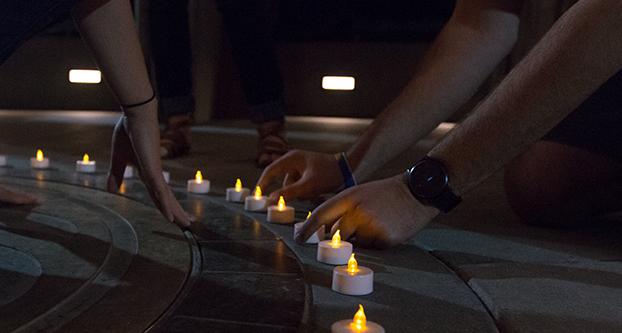To commemorate the 101 anniversary of the Armenian Genocide, Fresno State Armenian Student Organization (ASO) hosted a week full of activities.
A screening of “The Cut,” a film about the genocide was shown Wednesday and was followed by a candlelit prayer vigil in front of the Armenian Genocide Monument.
People of all age groups walked in the dark with a candle in hand to the monument where all the candles were placed and a prayer was offered in remembrance of all of the lost lives.
Elena Sarnazian, executive public relations officer of the ASO, said this particular film was shown because it is a new film and explains the genocide well to non-Armenians.
“It’s important to raise cultural awareness about the genocide because we are a growing community here in Fresno, and it’s nice to see different people from different communities coming together,” she said. “People need to understand that it was real. A lot of people don’t know what the monument is for, and they should come and read the information.”
The ASO also has recognized the genocide on Monday by passing out pamphlets, selling shirts and speaking to other students in the Free Speech Area.
Barlow Der Mugrdechian, coordinator for the Armenian studies program and director of the Center for Armenian Studies, said there were three questions his students always asked — “Why did it happen? How can such an event happen, and why did no one do anything about it?”
Mugrdechian said Armenian studies is significant for students at Fresno State.
“Armenian studies is very important because we are in the midst of a big Armenian community,” Mugrdechian said. “More than that, it’s history that tells about a group that many people don’t know about, so that you can tell about all the different things they have gone through.”
Michael Rettig, secretary for the ASO and a grad student studying history, said it’s important to remember the legacy of the genocide.
“There is a big Armenian community here in Fresno, so I think it helps students understand each other and where we came from and our past and what our ancestors went through,” Rettig said. “It’s an important issue, and it’s under the big umbrella of human rights. When people get away with these kinds of violations, it makes it easier for it to happen again.”
Rettig said he thinks the reason the Armenian Genocide is not taught in history book is due to politics.
“It’s starting to change now, but a lot of it is the Turkish lobby,” Rettig said.
Lucinae “Lucy” Ekezyan, president of the ASO, said that in President Barack Obama’s campaign for president, he said that he would recognize the genocide, but the ambassador of Turkey told him not to, and threatened the U.S., so he didn’t.
“The Jews have recognition of the Holocaust because Germany doesn’t really have any relationship with America that has constant benefit, as where Turkey provides the U.S. with oil and a naval base,” Ekezyan said. “So when you are talking about recognition for the Armenians, then you consider all the political aspects of it. You consider whether the United States is willing to do the right thing over what’s going to give them the most capital gain.”
Rettig said that because American history does not go into depth about all aspects in history, categories and subtopics are necessary.
“You kind of need categories because if you don’t have Armenian studies separate from the rest, it’s going to get one line in the book and be forgotten,” Rettig said.
Ekezyan said Hitler used the genocide as justification for his mass murders.
“The Armenian Genocide was the first genocide of the 20th century. It also created leeway for the Second World War, as Hitler justified his genocide on the Jewish people who today speak of the Armenians,” Ekezyan said. “He kind of justified what he was doing as OK because no one ever cared about what happened to the Armenians, so why would you care about what’s happening to the Jews? Why would you would care about what’s happening today [with] Boko Haram? Why would you care about the Rwanda Massacre?”
Ekezyan said that not having recognition for the genocide could be used to justify other immoral acts.
“It’s raising this issue that justice does not exist today and that we need to fight for it,” Ekezyan said. “Why are the Armenians less deserving of something that the Jews were granted, the slaves were granted? We just want our wounds to heal.”
Rettig said events like this help bring awareness to the Armenian Genocide, and Ekezyan said that knowing that there are people from every ethnicity taking notice and speaking on their behalf is uplifting.





